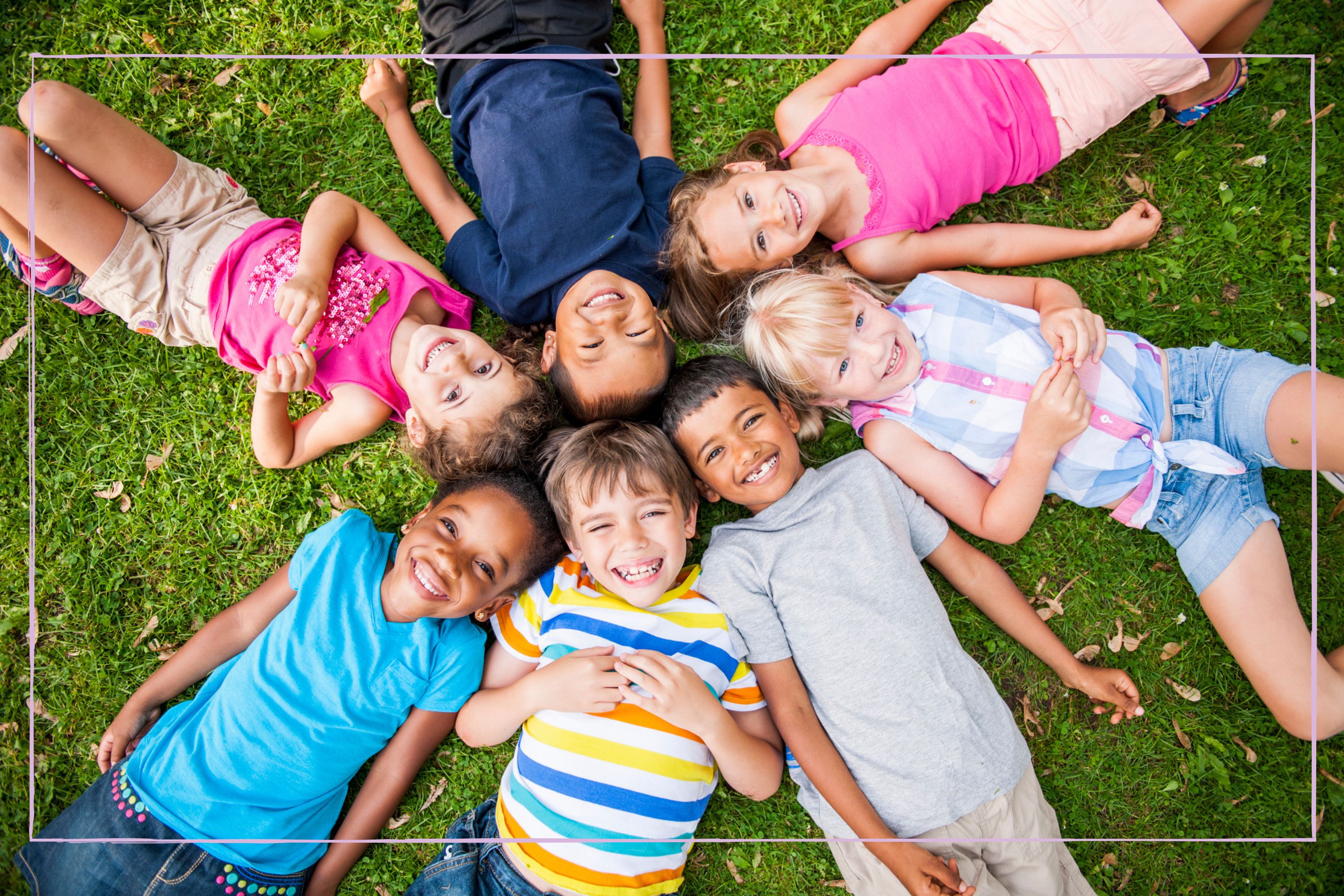How to raise happy kids - 8 expert tips to improve happiness (and how to be okay when your kid doesn't feel happy)
Raising happy kids isn't just saying yes to everything, here two experts tell all


Raising happy kids feels like parenting 101, right? But what does a happy kid look like? We ask the experts who offer their best advice on raising happy kids - and how that doesn't actually mean what we might think. A happy kid isn't constant smiles and laughter, but more a sense of confidence in their being.
Of all the parenting styles that are popular at the moment, having a happy kid is central to how parents are raising their kids. What happiness means or looks like, will vary between children, and many parents worry their little ones aren't happy enough. It's useful to remember that no simple, universal key to happiness exists, and no child will be happy all the time - and that's ok. While gentle parenting is gaining traction as an evidence-based approach to raising happy kids, the skills parents can instil for their children to lead a joyful life, don't have to be affiliated with any particular style.
We spoke to BACP registered counsellor and parenting expert, Jenny Warwick, who offered her opinion on raising happy kids. She told us "Encouraging a positive, loving, and supportive home environment can provide a strong foundation for emotional well-being. It's important to recognise that each child is unique and that happiness manifests differently in each of us, whether you're a child or an adult. Recognising, supporting, and celebrating your child's distinct personality and interests is crucial."
Whichever way you choose to raise your children, whether it be through permissive parenting or the helicopter variety, this article offers expert-backed ways to achieve a universal goal - help your child to be happy. The experts will also share their knowledge on why some children might not present as happy, and why this is ok. If you need further helpful articles and resources on your happiness journey, you'll find these at the end.
How to raise happy kids: 8 tips to try
1. Don't make happiness the goal.
This might seem surprising, but Psychologist Dr Becky argues that she doesn't make happiness the goal for her own three children. She said "When we make happiness our goal, we start to see our kids' distressing feelings as a problem to fix - rather than emotions to tolerate. And then what happens is we actually pass on our own anxiety to our kids - when we aren’t able to sit with our kids' difficult feelings, they learn that these feelings must be bad or threatening, and then they too start seeing distress as something to avoid, rather than something they should learn to manage. The more we help our kids learn to cope with distress, the less 'space' those feelings end up taking up; this is what allows for the natural emergence of happiness, from a place of feeling at home with oneself, not from a place of avoiding hard things at all costs."
2. Let kids express their emotions
Jenny Warwick told us "Teach your children that expressing their emotions, including unhappiness, is okay. Emotional intelligence grows from being able to acknowledge and understand our feelings. Helping them build resilience, the ability to bounce back from challenges and setbacks, can create a sense of accomplishment and contribute to long-term happiness. We learn from making mistakes, so frame them as an opportunity to learn and work out how to do better." Mum-of-three, Carlie, said "I constantly wanted to save my children from negative emotions. If they cried I immediately felt it was my job to make it stop, or if they were upset, I had to make the problem disappear. We've all been happier since I started realising it's not my job to micro-manage their emotions, but work with them to find something positive in whatever they're feeling."
3. Set realistic expectations
When you decide to make changes, including to instil an increased sense of happiness, Jenny stresses the importance of being realistic. She said "Setting realistic expectations for both you and your child is key. Ups and downs are a natural part of life, so there's no need to pressure yourself to be always happy - it's simply not realistic. Teaching healthy coping mechanisms to manage stress or difficult emotions is important. This empowers children to navigate life's challenges more effectively. The best and most effective way to do this is to show them how you manage challenges. Children learn by watching how their parents cope with setbacks. Similarly, demonstrating the value of self-care by practising it yourself can teach your children to prioritise their own well-being."
Parenting advice, hot topics, best buys and family finance tips delivered straight to your inbox.
4. Aim for contentment
Dan Mills-Da'Bell is an experienced BACP registered psychotherapist, and he also offered expert opinion on the concept of happiness in kids. He told us "If we were to think more carefully about what we mean by 'happy,' we might notice that we're talking about one emotion. Attempting to encourage just one emotional state on a much needed spectrum of emotions is problematic because we could even start to think about what even is 'happy' when it's not relative to other emotions? So it might be best to think of raising a child who is content - which might sound similar, but for me that implies a good engagement with the variety of emotions we really need to connect with."
5. Embrace acceptance
Dan shared with us what he means by this, saying "My biggest tip would be to embrace acceptance as a concept, within a broader PACE-approach. PACE stands for Playfulness, Acceptance, Curiosity, and Empathy and is an approach used in some therapeutic models but also an established form of caregiving or parenting. It's important to remember with PACE that A&E should come first - despite them not coming first in the word! So much like A&E at hospitals, it's your first stop. Acceptance is crucial because it enables your child to experience safety, being understood and really known. They know that their emotions are safe and comfortable for you to be with, whatever they are, and through that process can start to invite you into their inner world."
6. Accepting their emotions doesn't mean accepting any behaviour
Dan explained this one to us, saying "If there are negative behaviours attached to an emotion, we're accepting the emotion and process underneath, but not the behaviour, and it's important we label it that way in the language we use too. So letting your child know that the thing they just did wasn't ok, but that them feeling upset or angry is absolutely ok and then leaning into empathy, is a good strategy. Explain you're sorry they're feeling that way, noticing how they're feeling, helping with the words to describe how they're feeling, and letting them know you understand how hard it must be for them to feel that, and that you're there, you're with them, alongside them. If you recall a time when you've been really upset or angry and somebody tells you it'll be ok, or to see a different side, that's not massively helpful in the moment, because it misses where you are at, and invalidates what we feel."
7. Be playful
Dan told us "Playfulness is key too, and that doesn't mean just playing games, but noticing the modulation of our voice, the tone, using the small 'in jokes' we have our child to connect with them. If your child finds it hard to regulate their emotions, a PACE approach can be really helpful, and once you've helped them to regulate (because just telling them to calm down or stop isn't going to work!). You can then reason with them but they cannot engage that reasoning part of their brain until you've supported them to regulate their emotions."
8. Provide new experiences
Dan stresses the importance of enriching kids' lives with a variety of experiences. He added "Provide children with rich, new experiences, take gentle risks, let them know how much you think about them and hold them in mind (let them know you've been thinking about them, that something reminded you of them when they were at school for example). Accept their mistakes, their failures, and successes. Embrace and support who they are, and trying not to make assumptions about who they are based on who we'd like them to be."
If your kid's not happy that's okay too, and here’s why
Jenny reminds us that it's normal for children to experience a huge range of emotions, and they can't be shielded from unhappiness. Parents should remember that occasional unhappiness doesn't mean they've failed - as we've already said, full-time happiness simply doesn't exist. Jenny concluded "Instead of pushing your child to conform to a specific idea of happiness, help them find their unique way to feel happy."
Mum-of-two, Sian, told us she worried about her eldest son's happiness for years. She said "Even as a baby, my son didn't smile very much. I was always concerned he had a worried expression, and we had very few pictures of him smiling. As he grew older, it was clear he was a quiet child, and he didn't react with the same joyful laughter to things in the way his brother did. In my mind, he was unhappy. But I've come to realise it's part of his personality - he doesn't share the same sense of humour as me like his brother. We are different people, and he is actually hugely content with his friendships, school work, and interests. He's just not outwardly what people deem to be 'happy,' when he actually is. It was down to me to accept that, not try and change anything."
Dan suggested Sian's experience is likely to be felt by many parents, telling us "It's also important to remember that if your child isn't smiling or laughing, it doesn't mean they're not happy. We all feel and express things in different ways, and they may be lost in their own joy inside their heads, so be curious, wonder aloud with them, and maybe you'll be fortunately and lucky enough to be invited into their inner worlds to explore, share, and join!"
Dan reiterated that If your child isn't happy, they shouldn't be rushed into feeling a certain way. What parents can do, is help them build skills and resources to manage difficult situations and emotions while letting them know they can always talk to you without fear of judgment - you are their psychologically safe, welcoming presence.
He also reminds parents that they will get things wrong, and not to worry. He told us "Remember you're human and you can't always get things right! If you feel like you've said something to potentially even make a situation feel worse, remember that a rupture can always be repaired. Take responsibility for repairing your relationship, modelling how important that is, and the power of an apology to a child."
Additional support
- Dr Becky. Famed Psychologist Dr Becky has a huge presence on social media, sharing excellent words of wisdom on managing difficult emotions and situations.
- If listening is more for you, Dr Becky's free podcast covers a selection of topics, each with advice to empower you to become the parent you want to be.
- Dr Julie. Dr Julie Smith shares plenty of actionable advice relating to both the mental health and happiness of children, and adults.
- Dr Martha. Another relatable Psychologist, Dr Martha has plenty of free and paid resources for parents looking to raise happy kids.
- Catherine Hallissey. Also a Psychologist, Catherine specialises in helping parents raise confident, resilient children.
- They Are the Future. A website from Dr Lucy Russell, sharing articles and resources relating to parenting and well-being support for those with school aged children.
For more on parenting, we've shared how to raise resilient kids, and the 164-year-old Swedish secret that might be helpful in doing just that. Most parents hope to raise successful children, and a psychologist has shared one simple tip for where to start.

Jenny Warwick is a BACP registered counsellor and parenting expert. She is an online counsellor specialising in helping parents and carers manage the distinct challenges of their child's tween and teenage years. Her approach involves providing personalised support to help individuals balance their work, home, and family responsibilities, promote emotional health, and develop stronger connections with their children.

Dan Mills-Da'Bell is an experienced psychotherapist who specialises in a helping adults and young people with a range of issues including relationships, trauma, and stress. He is also an accredited member of the British Association for Counselling and Psychotherapy (BACP).

Lucy is a mum-of-two, multi-award nominated writer and blogger with six years’ of experience writing about parenting, family life, and TV. Lucy has contributed content to PopSugar and moms.com. In the last three years, she has transformed her passion for streaming countless hours of television into specialising in entertainment writing. There is now nothing she loves more than watching the best shows on television and sharing why you - and your kids - should watch them.